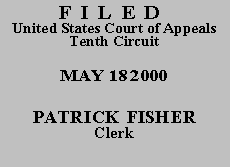

| UNITED STATES OF AMERICA,
Plaintiff-Appellee, |
|
| v. | |
| ERIN SLOANE SMITH,
Defendant-Appellant. |
|
Erin Sloane Smith seeks a certificate of appealability to appeal the district court's dismissal of her 28 U.S.C. § 2255 petition as untimely. We exercise jurisdiction pursuant to 28 U.S.C. § 1291, deny a certificate of appealability, and dismiss the appeal.
Smith pled guilty and was convicted of conspiracy to possess with intent to distribute more than 100 grams of methamphetamine, in violation of 21 U.S.C. §§ 841(b)(1)(A) and 846. On October 16, 1996, the district court sentenced Smith to 168 months in prison, and the judgment was filed on October 24, 1996. On June 16, 1997, Smith filed a notice of delayed appeal, alleging that her attorney had refused her request to file an appeal after sentencing. This court dismissed Smith's appeal on October 15, 1997, as untimely.
On July 27, 1998, Smith filed her 28 U.S.C. § 2255 habeas petition, alleging that her guilty plea "was coerced due to mitigating circumstances," she received ineffective assistance of counsel, and the district court committed sentencing errors. Record, Tab 1. On October 26, 1999, the district court adopted the magistrate's findings and recommendation and dismissed Smith's § 2255 petition as time-barred under the Antiterrorism and Effective Death Penalty Act of 1996 (AEDPA).
Smith contends she "has been denied one of her most basic rights in the judicial process, that being the right to appeal her conviction and/or sentence." We review the district court's legal rulings de novo and its findings of fact under a clearly erroneous standard. United States v. Cox, 83 F.3d 336, 338 (10th Cir. 1996).
The AEDPA amended 28 U.S.C. § 2255 to allow federal prisoners one year from the date on which the judgment of their conviction became final to file a motion to vacate, set aside, or correct their sentence. The judgment of sentencing was entered on October 24, 1996, and Smith had until November 4, 1996, to file a direct appeal. Fed. R. App. P. 4(b)(1); see United States v. Burch, 202 F.3d 1274, 2000 WL 121292 (10th Cir. 2000) (holding that when petitioner files a direct appeal, the "judgment of conviction is final after the time for seeking certiorari review has expired"). Smith filed her § 2255 motion on July 27, 1998.
Smith argues the one-year limitations period did not begin to run until this court denied her untimely direct appeal. However, Smith did not pursue her direct appeal within the applicable time limits and her unsuccessful efforts do not toll the statute of limitations. Further, even if the limitations period was tolled and the time between Smith's filing of her untimely appeal and this court's disposition of that appeal was subtracted, Smith's petition was still filed more than one year after her conviction became final. "There may be circumstances where the limitations period at least raises serious constitutional questions and possibly renders the habeas remedy inadequate and ineffective." Miller v. Marr, 141 F.3d 976, 978 (10th Cir. 1998). Smith argues her untimely notice of appeal should have been accepted. This issue has already been decided against Smith by this court. She does not present arguments as to why she filed her § 2255 out of time. See Miller, 141 F.3d at 978 (noting that defendant "provided no specificity regarding the alleged lack of access and the steps he took to diligently pursue his federal claims"). The district court did not err in dismissing Smith's § 2255 petition as untimely.
Smith's application for a certificate of appealability is DENIED and the appeal is DISMISSED. The mandate shall issue forthwith.
Entered for the Court
Mary Beck Briscoe
Circuit Judge
*.This order and judgment is not binding precedent, except under the doctrines of law of the case, res judicata, and collateral estoppel. The court generally disfavors the citation of orders and judgments; nevertheless, an order and judgment may be cited under the terms and conditions of 10th Cir. R. 36.3.